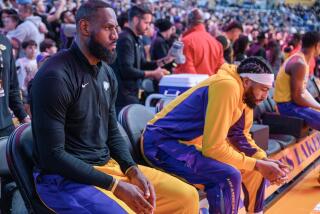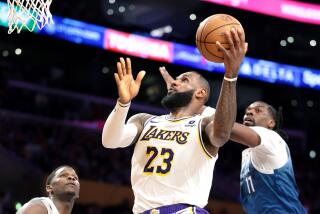THE MAILMAN : Jazz Forward Karl Malone Says He Doesn’t Expect--or Need--the League’s Stamp of Approval
- Share via
Gridlock took hold earlier than usual on a road leading to the 405 Freeway near Marina del Rey one recent Friday. A woman stopped her car in traffic, turned on the hazard lights, then eluded on-rushing motorists to cross the median and get Karl Malone’s autograph.
Horns blared. Malone, a forward for the Utah Jazz, was heading to his hotel room and not trying to draw attention. Although taken aback by the odd scene, Malone signed for the woman and continued on his way.
“That still blows my mind,” Malone said the next day. “This lady backed up traffic just to get my autograph. Me, when I was growing up, I never got autographs. I never thought somebody was so important to society to do something like that.”
Another player of Malone’s status might have come off as haughty in retelling the story. But Malone, still coming to terms with celebrity, simply smiled and shook his head.
His modesty is not false because, when it comes to basketball, he really is not modest. He acknowledges his place in the NBA hierarchy and enjoys the money and privileges. He will be the first to say he has abilities others do not, and that no single defender can stop him when he has the ball and the basket is within reach.
But the Mailman, as Malone has been called since starring at Louisiana Tech, does not like to make a big deal about being a big deal.
In February, for instance, he tried not to make much of an issue about being left off the starting lineup for the All-Star game despite being the league’s second-leading scorer. Privately, he seethed. Publicly, he had no complaints or criticisms of the Lakers’ A.C. Green, who beat him out in fan balloting.
And now, he has all but eliminated himself from consideration in the league’s most-valuable-player voting, even though he meets the criteria. Malone averages about 31 points, second to Michael Jordan; is fourth in rebounding at more than than 11 per game, and is fourth in field goal percentage at 57%.
“It isn’t gonna be me,” Malone said when asked about his chances in the seemingly wide-open MVP race. “The only time I think about it is when somebody mentions it. It’s nothing where I go to bed at night and say, ‘I hope I win.’ I don’t think I will. All this stuff has happened to me so quick, I can’t even comprehend it right now.”
In the end, Malone said, things such as awards and recognition are not what really matter. “What fascinates me is that athletes, in general, how we get wrapped up in all the hype,” Malone said. “That blows my mind, too. After a while, you start believing what they tell you. “My thing is, how did we get to be so important to society that people are stopping their cars to come see us? We get all these endorsements and big money. Don’t get me wrong, there’s nothing wrong with endorsements and money, but then you start looking down at people because people are telling you how great you are. I’m not going to be playing all my life, and I want to be the same guy who came into this league.”
Perhaps this is the same Malone who once was a child running the two or three streets of rural Mount Sinai, La. Outwardly, though, Malone has changed. At 26, he has matured and speaks as someone trying hard to retain his home-grown values.
Lounging poolside at a Marina del Rey hotel the day before the Jazz played the Lakers in a nationally televised game at the Forum, Malone wore a black cotton shirt buttoned to the collar, with only a few white polka dots, white linen walking shorts and white Italian loafers with no socks. Sunglasses were conspicuous by their absence.
Told that he had the requisite look for this town, Malone shook his head.
“In this town, to me, it’s about what kind of car you drive, what kind of watch you have on, all that stuff,” Malone said. “In Salt Lake (City), it’s not like that. You could drive a Mercedes or a Dodge Caravan there. Most people there’d prefer a Caravan because it’d fit all their kids.”
Malone laughed, squinting into the sun.
“But I like L.A., too,” he said. “I’d like hanging around Magic (Johnson). Man, if I ever played for the Lakers . . . “
Malone says he wants to do everything in his power to bring an NBA championship to the Jazz. Two seasons ago, Utah came within one game of eliminating the Lakers in the Western Conference semifinals. And since being ousted in the first round of last season’s playoffs, the Jazz have come back strong. They began the weekend leading the Midwest Division with a 53-23 record, the best in franchise history even before the season is over.
“When the team wins and you play good, everybody gets the glory,” Malone said. “You can score 30 points and average however many rebounds you want, but if your team doesn’t win, you have no chance at the MVP. I’m not dwelling on it. I’d rather win than get awards. I realize what I mean to this team. I realize who I am.”
Who Malone is, in strictly a basketball context, is perhaps the NBA’s best power forward. His only peer is Philadelphia’s Charles Barkley, technically a small forward. Barkley and Malone are two of the MVP candidates, along with Johnson, Jordan, Patrick Ewing, Akeem Olajuwon and David Robinson.
So, at the very least, Malone is the NBA’s sixth-best player. But no one in the league is universally praised more than Malone for his varied talents.
“Karl Malone is the definition of what a power forward is supposed to be and do out there,” Coach Del Harris of the Milwaukee Bucks once said.
Malone, 6-feet-9 and 256 pounds, has added dimensions to what has been the popular definition of his position. Not merely a rebounder and low-post defender, Malone has become a prolific scorer from the perimeter as well as inside. He runs the floor with the speed of guards, out-muscles taller and wider centers, dominates players his own size and, this season, has added three-point range to his talents.
“You can’t stop him,” Laker Coach Pat Riley said. “If you double him, he’ll find the other guys. If you don’t double him, he’ll wear you down. He’ll beat you in transition. His first three steps out of the block are the quickest of anybody’s in the league. He just explodes out of the lane. When he gets down low, he intimidates guys. You don’t see anybody try to go one on one with him.”
Malone intimidates opponents with his ferocity. He grinds his teeth and plays to the crowd with exaggerated gestures.
“When I’m in the paint, I get down and dirty,” Malone said. “Well, not dirty. But they should let you play as hard as you can, to the point where you shouldn’t try to hurt somebody. The paint is where men are made. As long as it doesn’t get really ugly.
“When I’m in the paint, I love it. I love to punish people. If the shoe was on the other foot, they’d try to punish me. I’ll tell you this: You won’t get me twice in a row. You may get one shot in, and I’ll let you know you got that shot in. But then, for the rest of the night, you’re in for it.”
Malone, in his fifth NBA season, has learned what officials will tolerate. He once told a reporter that he has learned to grab the back of a player’s jersey when officials are not looking, to step on another player’s foot before that player jumps for a rebound, to furtively throw elbows.
All Malone will say now is that elbows and shoves are common among the league’s big men. And, since he wants to dominate all aspects of the game, he had to learn.
Some say Malone has learned too well and that referees let him get away with fouls. On April 4, after Malone scored 36 points against the Charlotte Hornets, losing Coach Gene Littles decried Malone’s aggressive play.
“He’s the toughest guy because he’s the only guy in the league they allow to throw you out of the post,” Littles said. “Maybe because he does it all the time, it’s perfectly legal. If we do it, it’s a foul. He is a great player, but maybe he thinks he’s better than he really is. . . .
“Instead of playing, he talks to coaches on the bench. He should just play basketball. He hasn’t won any championships. When he wins some championships and shows me some rings, maybe I can say he’s a great player. He’s averaging 31 points a game and having a great year, but he should just play and not talk so much.”
Said Malone: “If I was on Coach Littles’ team, he wouldn’t be saying that. Here’s a guy, he doesn’t even know what post-up guys do.”
Three seasons ago, during the conference semifinals, Riley told Michael Cooper to play Malone on the wing and force him to the baseline. The first--and last--time Cooper tried it, he had to pick himself up off the floor.
The Lakers considered it a success when center Mychal Thompson held Malone to 25 points in a Laker victory April 1 at the Forum. Thompson’s strategy was to drape himself over Malone and receive help from two or three teammates.
“With Karl, you have to match meat for meat with him,” Thompson said.
“But he’s a double-beef burger, and I’m just a quarter-pounder. Karl also can move that strength all over the floor. That’s what makes him so dangerous.”
That also is why Malone, modesty aside, says that no player can stop him.
“When one guy can stop me, that’s when I retire,” Malone said. “If there was another Karl Malone out there, I could stop him. I’m not going to say how. But the Magics, the Birds, the Jordans, the Barkleys--it’s awfully hard to stop them when they’re on their games.
“Me, I feel when my jump shot is working, then go inside and make a few baskets, then make a few passes, I’m now in my rhythm and it’s awfully tough to stop me.
“You’ve been in an arena where you see a guy--it don’t matter what you do to him--he’s on fire. You’re just hoping, sooner or later, he’ll cool off. When I feel it, I can fill it.”
Malone has had games of 61, 52 and 49 points this season. The 61-point game came Jan. 27 against the Bucks, the Jazz’s first game after the All-Star voting was announced. Malone reached 61 points in slightly more than three quarters.
When Malone reached 53 early in the fourth quarter, Coach Jerry Sloan sent reserve Mike Brown to the scorer’s table to replace Malone. Before play stopped and Brown could get in, Malone scored eight more.
This season, Malone has scored many of his points from three-point range. He has made 37% of his three-point tries, including one at the buzzer that beat the Lakers Jan. 30.
“I try to work on something every summer,” Malone said. “This summer, it was the three-pointer. So, when the season rolls around, all you guys say, ‘How’d he do that?’ I remember Coach Riley said the last time I was (in Los Angeles), ‘The least likely guy to beat us on the three was Karl Malone.’ But, hey, I’ve worked on my outside shot.
“I’m not saying I’m a great player, but if you look at all the great players, like Magic and Jordan, they come back every year with one thing you didn’t see last year. After a while, you’ve got everything in your game. Then, you say, ‘How are you gonna stop him?’ That’s what I try to do when I go home in the summer.”
Home, for Malone, in the summer now is Dallas. It is only a three-hour drive to the home he built for his mother, Shirley Turner, in Summerfield, La.
By now, Malone’s mother is almost as well known as he is. His father left home when Karl was a child, and Shirley reared eight children by herself while running Turner’s Grocery & Washeteria in Summerfield.
“I try to remember my roots, but now I don’t have the time that I used to, to stop by Louisiana and hang out all summer,” Malone said.
“But I try to remain the same person, treat everybody the same. My mom wouldn’t let me do it any other way. The more I’ve grown and matured, the more she’s let me make my own decisions.
“The last couple of years, she’s cut the cord, and I live the life I want to live. I guess that’s what growing up is. But I still ask for her advice.”
Malone maintains daily contact with his mother, even when he is in Salt Lake City, where he also keeps a home. He has his own construction company there and spent part of last summer in Utah filming an independently produced movie. The film is based on the life of Porter Rockwell, Mormon leader Brigham Young’s right-hand man.
Malone, who never acted before, played Rockwell’s sidekick, said to be the first black man in Utah. Malone said he enjoyed the experience. He got to ride a horse and had extensive dialogue. The film, Malone said, will be released in May.
“I never acted a day in my life,” Malone said. “But I felt really good about it. I did it because it was fun. But, since then, I’ve gotten about two or three other offers.”
Fearful that people might think he has gone Hollywood, Malone says he does not aspire to a film career.
Malone said he will play five more seasons, until he is 31, then retire to what he says will be a quiet life. Only then will he consider marriage and a family.
“When you play in the NBA, you’re in a certain spotlight,” he said. “But my life is not really fast-paced. True, I like nightclubs, like the next guy, but I also like quiet evenings at home.
“I’ve got my mind set on having a family and settling down. I want to be able, when we have that first little Mailman, to see him every day. I want to be able to drop him off at school, take him to the park. I want to do all those things in life you never think about.
“Some guys play the game, travel all the time, and never see their kids. Dad’s not around, so all they have is Mom in their lives. I want to be the father that, growing up, I didn’t have. I had my stepfather, but I knew he wasn’t my real father. That’s something I always dreamed of doing.
“In five years, I want to do that. I’ll be 31 and I figure, if I hadn’t done all I wanted to do in basketball by then, I won’t ever do it.”
More to Read
Go beyond the scoreboard
Get the latest on L.A.'s teams in the daily Sports Report newsletter.
You may occasionally receive promotional content from the Los Angeles Times.










